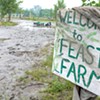Published May 15, 2007 at 9:29 p.m.
Step aside, Al Gore: There's a new climate activist on the block. Or rather, a spotted horde of them. At Teddy Yandow's Cimarron Farm in St. Albans, cows are replenishing topsoil faster than you can say "carbon sequestration."
Well, maybe not that fast. But according to 34-year-old dairyman Abe Collins, who co-manages the operation with Yandow, "carbon farming" could be the next big strategy for combating global warming - the subject of Gore's Oscar-winning film An Inconvenient Truth. Like global warming, "carbon farming" requires some patience to understand. But, says Collins, the practice holds the potential to neutralize Vermont's "carbon footprint" - shorthand for "shlock we spew into our atmosphere." He also claims it could give a significant economic boost to the state's agricultural sector.
How does this "carbon farming" operation work? Well . . . it doesn't yet - Collins and Eric Noel co-founded the group Carbon Farmers of America in late 2006, but none of their 14 co-members will turn a profit until next spring, at the earliest. In theory, though, the farmers would sell the very carbon content of their topsoil as a climate-saving "carbon sink" - a.k.a. "voluntary carbon offset" - as you would a carrot, except carbon sinks taste pretty bland. "Some of it is basic ecology. Other parts are more esoteric," Collins understates.
No kidding. But believe it or not, carbon offsetting is a fast-growing, user-friendly economic strategy that enables guilt-stricken - ahem, "planet-protecting" - environmentalists to have their carbon cake and eat it, too. In other words, eco-consumers pay other people to combat global warming, sort of like a dog-walking service for your conscience.
As it turns out, Vermont's already on the offset bandwagon. Central Vermont Public Service (CVPS) sells farm methane, or "Cow Power," credits - an endearing euphemism for "incinerated manure." Charlotte-based NativeEnergy funds wind, solar, bio-gas and farm methane projects all over the country. Carbon Farmers of America, however, take the offsetting process a step further. "A carbon sink is an ecological sink," Collins elucidates. "We're using it as a brand name."
Carbon farming may sound confusing, but not when it comes to the money part. Collins, the acting president of Carbon Farmers, says the going rate for carbon-rich soil is $25 per ton. Crunch a few more numbers, and suddenly there could be a potential $900,000 profit sitting right under Collins' nose. Or is it feet?
***********
It's a sunny Wednesday afternoon in St. Albans. Collins strolls around the 185-acre Cimarron farm with a 3-foot "core sampler" - imagine back-to-the-lander Scott Nearing with a Star Wars fetish. Eric Noel, Collins' business-partner-slash-best-bud, looks on mutely while Collins probes the dirt, as if spectating at a sluggish minor-league baseball game.
But there's plenty to get excited about. In a few weeks, Collins says, the results from this sample will tell him just how much topsoil Cimarron farm has added to the earth's surface in the last year. Then he'll keep shopping his topsoil around to interested offset buyers - he estimates having sold about $25,000 in offsets so far.
The rolling grasslands here have been divvied up into 80 2-acre paddocks of electric-green pasture. That's because carbon farming requires short, intensive periods of active cow grazing, followed by long ones of rest and recovery: Tight parceling controls grazing patterns. "We're basically jumpstarting the soil-formation process," Collins explains.
With all its subdivisions, this dairy farm escapes classification. Collins, too, breaks the mold of a stereotypical dairyman. With an Oakland Raiders hat and socks paired with sandals, this perma-grinner could be touring an ashram in Arcata instead of a farm in Franklin County. His soft-spoken, beanpole partner, however, is about as straitlaced as they come. Together, the men embody the paradox of carbon farming itself: heady environmentalism meets old-school stewardship.
**********
Offsets are great, both for green business and the planet. Collins, however, is careful to emphasize that offsets alone won't mitigate the ecological crisis. "There are a lot of people making a lot of money doing absolutely nothing in the carbon credit world," he laments. For all the benefits of carbon offsetting, Collins points out, offsets can encourage people to "buy their way out of guilt."
Carbon farming, though, might represent a more . . . er, grassroots . . . approach to carbon offsetting. Notes Collins, "Climate change is because of fossil fuels, but it also has to do with bad land management. Humanity is destroying topsoil faster than we're building it. That's the definition of unsustainable."
He's right. According to USDA figures, the United States loses 1.8 billion tons of topsoil every year. What gives? Simply put, soil gets churned up, pumped with pesticides, and left out to dry - sort of like what would happen if everyone in your neighborhood watered their gardens with Drano for a month, except on a vast scale.
"When we talk about climate change, we don't talk about how the carbon cycle is the cycle of life," Collins says. "The more photosynthesis we have, the more we have real economics."
"That's not gonna happen when you have an economy driven by fossil fuel and pharmaceuticals," Noel reflects acidly.
"Ecological agriculture is still marginal to corporate ag," Collins concedes. "But it's growing."
According to Collins and Noel, Vermont is poised to join a celebrated international grass-farming movement. They've been studying up on grass-farming lit for a few years now, especially the writings of Australian grass guru Allan Yeomans, son of über-grasser P.A. Yeomans. Collins says the younger Yeomans' book, Priority One: Together We Can Beat Global Warming, proposes that planned grazing could save the world from ecological meltdown.
What could it do for Vermont? Collins estimates that if a sixth of the state's 660,000 acres of crop- and pastureland increased its soil organic matter by 2 percent - at a depth of 1 foot and a price of $25 per ton - the state could become "carbon-neutral" in only a few years - a potential net profit of $180 million, plus multiplier effect.
That revenue wouldn't just benefit local economies. If Collins' predictions are right, the approximately 9 million metric tons of greenhouse-gas CO2 emitted into the atmosphere by Vermont's cars, power plants and other nasty point sources would be cancelled out by all the carbon being sequestered in its soils. Translation? Carbon farming equals good news for all sorts of living organisms and natural systems - especially watersheds.
Do the numbers check out? Jeff Comstock, soil scientist at Vermont's Agency of Agriculture, has his doubts. "From an agronomic standpoint, increasing soil organic matter is really hard," cautions this dirt expert. He adds that, while he's not familiar with Collins' proposal or concept, the whole premise strikes him as a bit shaky. "It takes a fairly long time to significantly increase your soil organic matter," Comstock notes. He's "not sure [he] fully understand[s] how carbon trading applies to soil."
Collins isn't fazed. "The orthodox understanding of topsoil is that it's a non-renewable resource. We've known for over 50 years that it can be formed very quickly . . . but that info hasn't permeated the universities and established agricultural institutions," he says. "That's why we're backing [our carbon farming] up with scientific monitoring."
As Collins and Noel walk the fields together, butterflies flit. A muskrat lounges on the surface of an irrigation pond. The whole experience calls to mind a scene from The Adventures of Tom Sawyer, except that the conversation lends it a touch of apocalypse.
"Carbon is the keystone for every atmospheric process out there," Collins says over the buzz of some noisy toads, as he and Noel stop to gaze across an empty paddock. "The carbon cycle's a fulcrum. We balance the world with it . . ."
He pauses. "A fulcrum, or a lever? Maybe it's a lever?"
Noel shrugs.
"Soil quality affects things like water quality, human health," Collins continues.
"Right," Noel chimes in. "We're the most well-fed, under-nourished country on Earth."
Twenty minutes later, the men are standing proudly before their cow-activists. Collins grabs a rope and begins herding the animals from one pasture to another. The process looks casual enough to an uninformed observer, but in fact the grazing patterns on this farm have been meticulously planned, almost to the hour.
"Kumbas! Kumbas!" Collins shouts - old English, he says, for "Come, bossy!" Noel stands around chewing a length of grass.
"Moo! Moo!" counters activist number 25, as if to say, "Kumbas yourself!"
"Moo. Moo?" says number 825, a bit tentatively.
The cows wave their tails to shoo flies away. One mounts another, then loses interest.
Collins approaches Noel and gestures at a haystack.
"That's a practice stack," he cautions.
"What, it didn't get stacked properly?" Noel inquires.
"Uh . . . no. It got moldy, somehow."
"You mean it wasn't dry enough?"
Judging by their rapport, it seems as though these carbon farmers grew up together. But Collins hails from Rochester - he only moved to the area in 2003. Noel grew up on his family's 300-acre dairy in nearby Highgate, but worked as a racecar mechanic in Indiana for a while before settling down in Vermont. The two friends didn't meet until 2004 - through their wives, who met at the St. Albans farmers' market.
"Wives rule, literally," Collins states with a chuckle as he twists up a cigarette.
Then he gets serious.
"If society mobilizes around its farmers . . . we can do this fast," Collins contends. "The farmers are the interface between society and the land."
He waves at the cows with his cigarette. "This can be done in a decade. What we need is the political will and the economics."
The cows are still swatting flies.
According to Collins, "The way [the U.S. government] tackles problems now" is absurd, whether its foe is Al Qaeda or water pollution. He adds, "A 'war on terrorism'? 'Phosphorous'? What's next, 'oxygen'?"
Noel agrees. "They're trying to put Band-Aids over the real problem: degradation of topsoil."
************
On the horizon, sunshine melts behind a storm front, and the air grows thick with haze and anticipation: This summer will be big for farmers like Collins, Noel and all affiliated moo-mamas.
Will carbon farming take root on a massive scale? It's hard to say, since no one's determined exactly how much carbon the soil can hold. Besides, while the practice promises untapped benefits for planetary health, it's still largely ignored by the environmental community as a climate-saving strategy. So until the Carbon Farmers of America score certification from an international carbon-offset regulator, they'll be relying on donations from soil-savvy citizens.
"Who's gonna pay for [carbon farming] in a voluntary market?" Collins asks rhetorically. The guy's expression is over-eager, but in such a pleasant way, like a kid gushing about a school project.
"People who care," he answers.
Speaking of...
-

Defiant Franklin County Sheriff Blasts Media, Lawmakers
Dec 11, 2023 -

Stamford Wind Proposal Tests Whether Large Turbines Have a Future in Vermont
Nov 22, 2023 -

Prosecutor Turned Priest Named Franklin County State's Attorney
Sep 4, 2023 -

Legislators Dig In for an Impeachment Drama Involving Franklin County Law Enforcement
May 10, 2023 -

Vermonters Look for Cheaper Ways to Keep Their Homes Warm This Winter
Nov 9, 2022 - More »
Comments
Comments are closed.
From 2014-2020, Seven Days allowed readers to comment on all stories posted on our website. While we've appreciated the suggestions and insights, right now Seven Days is prioritizing our core mission — producing high-quality, responsible local journalism — over moderating online debates between readers.
To criticize, correct or praise our reporting, please send us a letter to the editor or send us a tip. We’ll check it out and report the results.
Online comments may return when we have better tech tools for managing them. Thanks for reading.










































